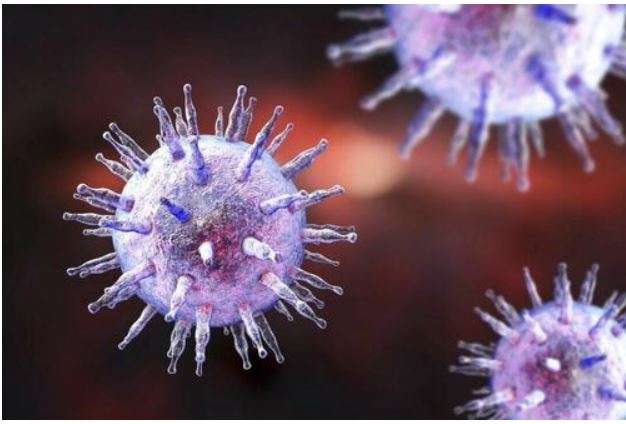Authored by Emma Suttie via The Epoch Times (emphasis ours),
Viral infections are thought to be a central cause of between 10 to 20 percent of cancers worldwide, representing a significant portion of the global cancer burden.
A recent discovery may further our understanding of how viruses cause cancer.
Researchers from the Cleveland Clinic uncovered one of the mechanisms that a type of virus called Kaposi sarcoma-associated herpesvirus (KSHV) uses to induce cancer.
The study, published last month in Nature Communications, found that the KSHV virus activated a specific pathway responsible for cell metabolism and the way cells grow and multiply. Using current U.S. Food and Drug Administration (FDA)-approved breast cancer drugs, they were able to reduce the replication of the virus, stop the progression of the lymphoma, and shrink existing tumors in preclinical models.
Jun Zhao, of the Cleveland Clinic Florida Research and Innovation Center, who holds a doctorate in genetic, molecular, and cellular biology is the study’s lead author.
“Our findings have significant implications: viruses cause between 10% to 20% of cancers worldwide, a number that is constantly increasing as new discoveries are made. Treating virus-induced cancers with standard cancer therapies can help shrink tumors that are already there, but it doesn’t fix the underlying problem of the virus,” Mr. Zhao explained in a news release. “Understanding how pathogens transform a healthy cell into a cancer cell uncovers exploitable vulnerabilities and allows us to make and repurpose existing drugs that can effectively treat virus-associated malignancies.”
Kaposi Sarcoma-Associated Herpesvirus
Kaposi sarcoma-associated herpesvirus, also known as human herpesvirus 8 (HHV8), is “A type of virus that causes Kaposi sarcoma (a rare cancer in which lesions grow in the skin, lymph nodes, lining of the mouth, nose, and throat, and other tissues of the body). Kaposi sarcoma-associated herpesvirus also causes certain types of lymphoma (cancer that begins in cells of the immune system),” according to The National Cancer Institute.
According to the news release, Kaposi sarcoma-associated herpesvirus is similar to other herpesviruses in that it is often asymptomatic and stays in the body laying dormant after primary infection. However, when the immune system becomes weakened or compromised, as it does in many elderly people, transplant recipients, or those with HIV or AIDS (acquired immunodeficiency syndrome), the virus can reactivate. In these high-risk immunocompromised groups, the reactivated virus “can trigger aggressive cancers.”
Cancer cells replicate quickly and reprogram the body’s metabolism to help them grow and spread. Most viruses don’t produce their own energy or the molecules they need and therefore hijack the body’s cells to do the work for them. However, the researchers found that the KSHV virus assumes control of two host proteins (CDK6 and CAD) which causes the virus to replicate more quickly and the cells to multiply and spread out of control.
The news release also states that KSHV-induced cancers are “fast-acting, aggressive and difficult to treat,” and that an estimated 10 percent of people in North America and Northern Europe, and 50 percent of people in Africa have KSHV, although the numbers are thought to be much higher because the virus can present without symptoms and often goes undiagnosed.
A University of Pittsburgh article about KSHV writes, “It is highly likely that over 95% of persons who are healthy and infected with KSHV do not have symptoms and never will,” and that problems develop once a person’s immune system becomes compromised.
Viruses and Cancer
In addition to KSHV, several other viruses are known to cause human cancers. According to the American Cancer Society, the following viruses can cause cancer in humans:
- Human papillomaviruses
- Epstein-Barr virus
- Hepatitis B virus and hepatitis C virus
- Human immunodeficiency virus
- Human T-lymphotropic virus-1
- Merkel cell polyomavirus
The American Society of Microbiology states that “Viruses can lead to cancer by associating with host proteins, proliferating when the human immune system is weakened, and hijacking proliferating human cells. Compared to other viruses, human tumor viruses are unusual because they infect, but do not kill, their host cells.” This process allows the human tumor viruses to initiate ongoing infections.
The research team discovered that the combination of Palbociclib—a drug that is FDA-approved to treat breast cancer and works by blocking CDK6—and a compound that blocks CAD (the two host proteins that are hijacked by the virus) caused a substantial reduction in tumor size and improvements in cancer survival rates in preclinical models. According to the news release, “Most tumors virtually disappeared after about a month of treatment, and remaining tumors shrank around 80%. Survival increased to 100% for selected lymphoma cell lines.”
Future Impact
The findings could lead to new options for the treatment of KSHV-associated cancers, which include Kaposi’s sarcoma, primary effusion lymphoma, and HHV8-associated multicentric Castleman disease. They could also potentially extend beyond KSHV-associated cancers to other viruses that cause cancer using the same or similar mechanisms.
As for what the findings mean for the future, Mr. Zhao says, “Cellular metabolism could be hijacked by both viruses and cancers for pathogenesis. By investigating these metabolic rewiring mechanisms, we aim to find the Achilles’ heel of cancer-causing viruses and non-viral cancers. I’m excited to see what the future of this work holds.”







